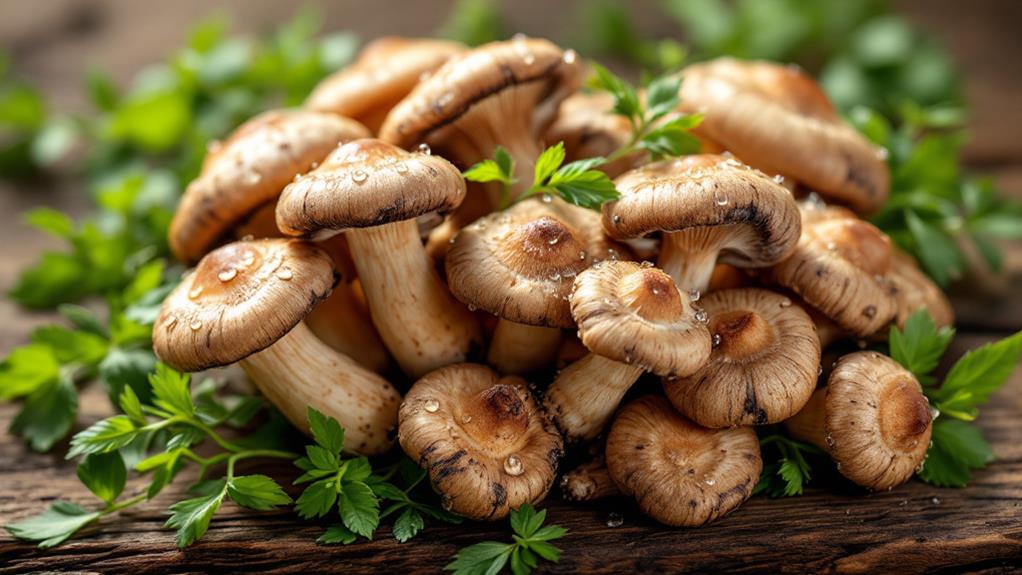Oyster Mushrooms: Health Benefits and How to Cook Them

Oyster mushrooms offer incredible health benefits and are a fantastic culinary ingredient. They're low in calories and packed with nutrients like protein, fiber, vitamin D, and antioxidants, which can enhance your immune system and promote heart health. They're easy to cook; try sautéing them for a quick, flavorful dish, or grill them to add a smoky depth to your meals. These mushrooms also enrich soups, stews, and pasta with their mild, umami flavor. Incorporating them into your diet is a smart choice for both taste and nutrition. Uncover how they can transform your dishes and well-being.
Understanding Oyster Mushrooms
Oyster mushrooms, scientifically known as Pleurotus ostreatus, are intriguing fungi that exhibit a range of enchanting colors like gray, golden, and cream, often resembling the shape of a shell. These mushrooms are celebrated for their culinary applications and health benefits. They're the third most commonly cultivated mushroom worldwide and have been integral to numerous cuisines, particularly in Asia. Their mild, umami flavor makes them a flexible ingredient in soups, stir-fries, and sauces.
When you investigate oyster mushrooms, you'll uncover several types, each offering unique flavors and textures. Traditional pearl oysters, king oysters with their meaty texture, and lively pink and blue oysters can enhance any dish. They're available year-round, making them a convenient choice for your culinary endeavors.
Besides their culinary appeal, oyster mushrooms are low in calories and packed with nutritional value. They're known to support the immune system, making them a beneficial supplement to your diet. You can enjoy them fresh or in dehydrated forms, adapting different cooking methods like sautéing, roasting, or grilling to bring out their best flavors. Welcome the umami richness of Pleurotus ostreatus and experiment with these flexible mushrooms in your kitchen.
Nutritional Value
As you examine the culinary versatility of oyster mushrooms, it's likewise fascinating to contemplate their impressive nutritional profile. These mushrooms are a low-calorie food option, with just one cup (86 grams) containing approximately 28 calories. Despite their low calorie count, they pack a nutritional punch, providing 3 grams of protein and 2 grams of dietary fiber per serving, which can help keep you feeling full and satisfied.
Oyster mushrooms are rich in vital vitamins and minerals, enhancing their nutritional value considerably. They offer niacin (27% of your daily value), pantothenic acid (22% DV), and potassium (8% DV), all integral for maintaining good health. These vitamins and minerals support numerous bodily functions, from energy production to maintaining healthy nerves and muscles.
Moreover, oyster mushrooms contain high levels of antioxidants, such as ergothioneine, which help combat oxidative stress and contribute to general well-being. They also provide a good source of beta-glucans. These compounds are known for promoting heart health and supporting the immune system. Including these mushrooms in your diet can be a flavorful way to enhance your nutrient intake while enjoying their numerous health benefits.
Antioxidant Benefits

Delving into the antioxidant benefits of oyster mushrooms reveals their potent ability to combat oxidative stress. These mushrooms are rich in phenolic compounds, such as gallic acid and chlorogenic acid, which play a vital role in neutralizing free radicals. By reducing oxidative stress, you can lower your risk of developing chronic diseases like cancer and heart disease.
Oyster mushrooms harbor ergothioneine, a powerful amino acid known for its cell-protective properties. This compound helps shield your cells from oxidative damage, thereby offering potential health benefits, including a decreased risk of neurodegenerative diseases. Incorporating oyster mushrooms into your diet can be a proactive step towards enhancing your general well-being.
Here's why oyster mushrooms stand out:
- Rich in phenolic compounds: Combat harmful free radicals.
- Contain ergothioneine: Protect cells from oxidative damage.
- Lower inflammation: Improve antioxidant levels, reducing inflammatory markers.
- Potential to reduce chronic disease risk: Linked to reduced oxidative stress.
- Proven protective effects: Highlighted in test-tube experiments.
While further research is necessary to fully understand their effects in humans, existing studies showcase the promising antioxidant benefits of consuming oyster mushrooms. Start adding them to your meals and enjoy their protective health benefits.
Promoting Heart Health
Beyond their antioxidant prowess, oyster mushrooms also offer significant benefits for heart health. They're high in beta-glucans, which are known to lower cholesterol production. By improving your lipid profiles, these mushrooms may reduce the risk of heart disease. A study revealed that consuming just 30 grams of dried oyster mushrooms daily could decrease triglyceride and cholesterol levels, further supporting cardiovascular health.
Including oyster mushrooms in your diet can also help regulate blood pressure, thanks to their rich potassium content. Potassium plays an essential role in maintaining healthy blood pressure levels and improving endothelial function, both of which are vital for ideal heart health. Furthermore, the antioxidant properties of oyster mushrooms help reduce inflammation in your blood vessels. This reduction in inflammation contributes to a lower risk of heart-related issues, offering your cardiovascular system some much-needed support.
While more well-designed studies are needed to confirm these benefits, regular consumption of oyster mushrooms may improve general heart health. So, if you're looking for a tasty way to support your heart, consider incorporating these nutritious fungi into your meals. Your heart might just thank you for it!
Blood Sugar Management

Managing blood sugar levels effectively is vital, especially if you're dealing with diabetes or prediabetes. Including oyster mushrooms in your diet can be a smart move for better blood sugar management. These mushrooms have a low glycemic index, meaning they won't cause rapid spikes in blood sugar levels. Studies indicate that consuming 150 grams of powdered oyster mushrooms daily can reduce fasting blood sugar levels by up to 22% in diabetic patients.
Oyster mushrooms offer several benefits for managing blood sugar:
- Low Glycemic Index: Helps regulate blood sugar levels.
- Beta-Glucans: Slows down carbohydrate digestion and absorption.
- Improves Insulin Sensitivity: Beneficial for those with type 2 diabetes.
- Rich Fiber Content: Increases satiety, possibly reducing total carbohydrate intake.
- Sustained Energy Release: Promotes stable blood sugar levels over time.
Their high concentration of beta-glucans plays a key role in slowing down carbohydrate digestion, ensuring a more gradual release of glucose into the bloodstream. This contributes considerably to improved blood sugar control. Furthermore, the rich fiber content in oyster mushrooms helps you feel full longer, potentially reducing your total carbohydrate intake. Regular consumption may improve insulin sensitivity, making it particularly helpful for individuals with type 2 diabetes. Enjoy these health benefits by incorporating oyster mushrooms into your meals.
Supporting Immune Function
While balancing blood sugar levels is fundamental, oyster mushrooms offer more than just metabolic benefits. They're a powerhouse for supporting immune function. Rich in beta-glucans, these mushrooms bolster your immune response by activating immune cells, helping you ward off infections. The antioxidant properties of oyster mushrooms are significant in protecting immune cells from oxidative damage, ensuring your immune system stays robust and healthy.
Consuming oyster mushrooms can also help reduce inflammation markers in your body, which is essential for maintaining a balanced immune function and may lower the risk of autoimmune disorders. Their high levels of vitamins and minerals, like vitamin D and zinc, play a key role in sustaining peak immune system activity. Vitamin D is known for its immune-boosting capabilities, while zinc aids in the proper function of immune cells.
Studies show that integrating oyster mushrooms into your diet can increase the activation of interferon-γ, a major cytokine in the immune response, further strengthening your body's defenses. By including oyster mushrooms in your meals, you're not only enhancing flavor but also giving your immune system the support it needs to function at its best.
Additional Health Benefits

In complement to bolstering your immune system, oyster mushrooms offer a variety of other health benefits. These versatile fungi are packed with nutrients that can considerably improve your general well-being.
- Cholesterol Levels: Regular consumption of oyster mushrooms has been linked to reduced cholesterol levels, with studies showing a potential decrease of up to 37% in animal models. This makes them a heart-friendly food choice.
- Antioxidants: Rich in antioxidants like ergothioneine and glutathione, oyster mushrooms protect your cells from oxidative stress. These antioxidants may contribute to cancer prevention by reducing DNA damage.
- Vitamin D: Oyster mushrooms contain high levels of vitamin D, vital for bone health. Along with calcium and phosphorus, they help maintain strong bones and may prevent conditions like osteoporosis.
- Fiber Content: The high fiber content in oyster mushrooms aids in digestion and promotes satiety. This can support weight management and improve digestive health by keeping you fuller longer.
- Weight Management: Their ability to promote satiety makes oyster mushrooms an excellent food for those looking to manage their weight effectively without feeling deprived.
Incorporate oyster mushrooms into your diet to enjoy these health benefits alongside their rich, savory flavor.
Cooking Methods
Cooking oyster mushrooms can be a delightful experience, revealing their rich umami flavor and tender texture. One of the easiest cooking methods is to sauté them. Simply heat some oil in a pan and sauté the oyster mushrooms for 5-7 minutes. This amplifies their natural umami flavor and results in a tender texture that pairs well with a variety of dishes. If you prefer a smoky taste, try grilling them for 3-4 minutes on each side. This method adds a caramelized layer, complementing their mild sweetness.
Incorporating oyster mushrooms into soups or stews is another excellent option. They absorb the surrounding flavors while contributing their unique texture and nutrition. Plus, they're a fantastic way to enrich the entire dish. For pasta dishes, you can sauté or roast the mushrooms, adding a savory, meaty taste without using any actual meat. This is perfect for vegetarian meals or for simply adding depth to your sauces.
Before diving into any of these cooking methods, remember a few preparation tips: wash the mushrooms gently and remove any tough stem parts. This guarantees you achieve the best flavor and tenderness in your culinary creations.
Culinary Applications

Exploring the versatility of oyster mushrooms opens up a world of culinary possibilities. With their mild, sweet flavor, these mushrooms can transform an ordinary dish into something extraordinary. Regardless of if you're a vegetarian looking for a meat substitute or simply love experimenting in the kitchen, oyster mushrooms are your go-to ingredient.
Incorporate them into your meals in numerous ways:
- Sautéd: This cooking method amplifies their umami flavor and provides a delightful golden brown texture.
- Grilled: Perfect for summer barbecues, grilled oyster mushrooms add a smoky depth to dishes.
- Soups and Stews: Their subtle flavor enriches broth-based dishes, making them heartier.
- Stir-Fries, Pasta, and Salads: Their versatility shines when paired with garlic and onions.
- Fresh, Dried, or Canned: Oyster mushrooms come in different forms, allowing easy incorporation into recipes.
When you're at the store, select firm, evenly colored mushrooms. Store them in paper bags in the fridge to keep them fresh. Oyster mushrooms' culinary applications are endless. Regardless of if you're sautéeing them to perfection or adding them to your favorite dish, these mushrooms promise to boost your cooking experience with their unique flavor and adaptability.
Safety and Precautions
In the case of oyster mushrooms, safety should be a top priority. While they're generally safe to eat, you should be aware of potential allergies. Reactions like hives, swelling, or nausea might occur, so it's crucial to monitor your body's response. Always cook oyster mushrooms before eating them. Cooking not only improves their flavor but also makes them easier to digest, reducing the risk of gastrointestinal issues.
If you're foraging, proper identification is crucial to avoid toxic look-alikes that could pose health risks. Mistaking a harmful species for edible oyster mushrooms can lead to severe consequences. Exercise caution, especially if you're not an experienced forager.
Additionally, if you're sensitive to sugar alcohols, be mindful of the arabitol present in oyster mushrooms, as it might cause gastrointestinal discomfort. For those with gout, it's significant to limit your intake. Oyster mushrooms have a high purine content, which can exacerbate gout symptoms.




